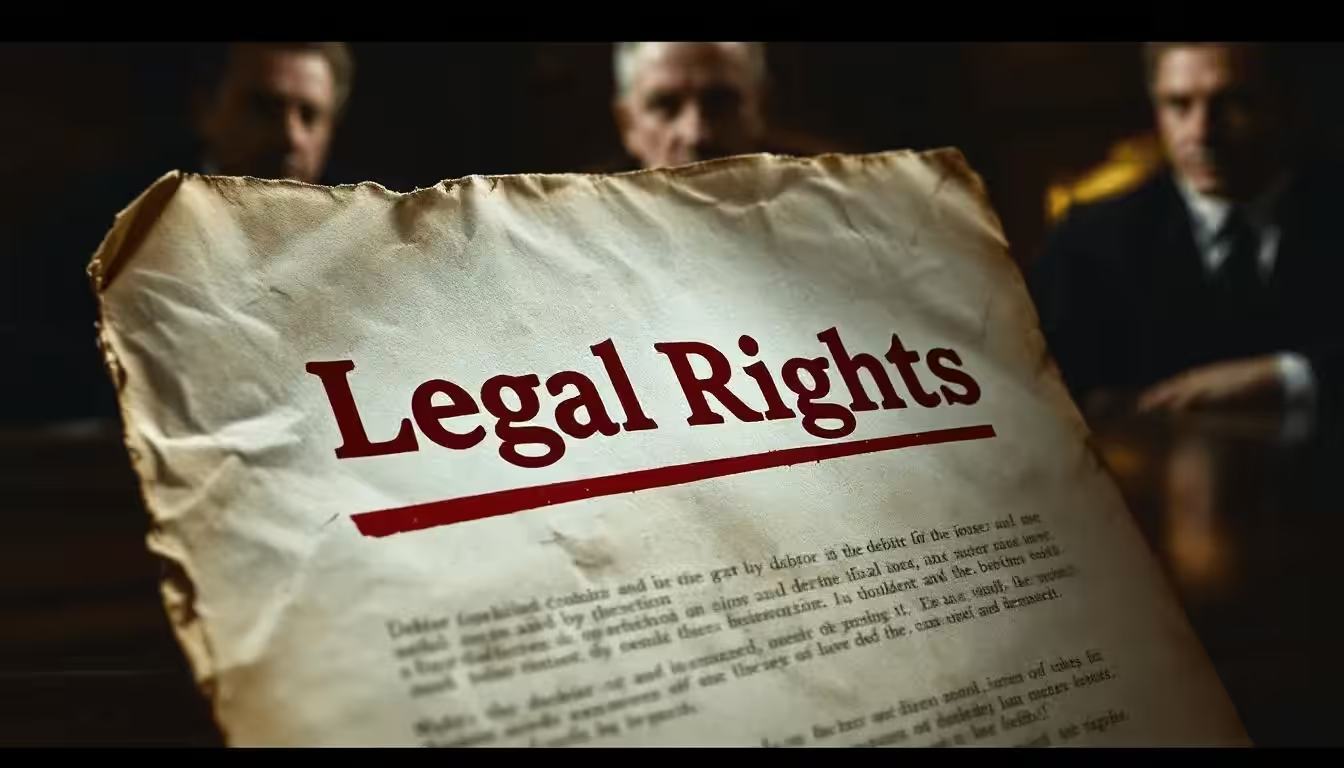What To Do If Being Sued By Debt Collector❓
Finding out that you’ve been sued by debt collector can be alarming. Your immediate action should be to respond to the lawsuit to avoid severe consequences like wage garnishments or property liens. In this article, we’ll walk you through the essential steps you need to take when you’re sued by debt collector.
Key Takeaways
- ➡️ Promptly respond to a debt collection lawsuit to avoid default judgments and limited legal options.
- ➡️ Understanding your legal rights and protections can empower you against aggressive debt collection practices.
- ➡️ Seek legal assistance and consider negotiation strategies to manage debt effectively and potentially achieve favorable repayment terms.
Immediate Actions to Take When Sued by a Debt Collector
The moment you receive court papers indicating that a debt collector files a lawsuit against you, your first instinct might be to panic. However, the most critical step is to respond to the lawsuit promptly. Key points to consider:
- ▶️ Filing an Answer is your formal response to the court summons.
- ▶️ It must be done within the timeframe specified by your state’s laws.
- ▶️ This step is crucial for responding to prevent a default judgment from being entered against you simply because you didn’t show up.
Your Answer should include all your defenses to the debt collector claims. These defenses cannot be introduced later, so include them from the start.
Important points to consider:
- ▶️ Ignoring the lawsuit could severely limit your legal options.
- ▶️ Delaying your response could also severely limit your legal options.
- ▶️ Limited legal options make it easier for the debt collector to win by default.
Consequences of Ignoring a Debt Collection Lawsuit

Ignoring a debt collection lawsuit is akin to burying your head in the sand while the tide comes in. Failing to respond to the lawsuit can lead to a default judgment against you. This judgment allows creditors to take more aggressive actions to collect the unpaid debt, including garnishing your wages. Imagine having a portion of your paycheck siphoned off before it even hits your bank account—it’s a scenario you want to avoid at all costs. If you choose to ignore the situation, the consequences can be severe.
A default judgment can also result in liens being placed on your property. This can complicate any future efforts to sell or refinance your home. Ultimately, the consequences of ignoring a debt collection lawsuit are severe and long-lasting, making it crucial to respond promptly and take the necessary actions to protect your financial well-being.
Legal Rights and Protections for Debtors

When a debt collector sues, it’s easy to feel powerless. However, both federal and state laws offer protections against aggressive debt collection practices. Certain types of income, such as Social Security benefits and essential personal property, are exempt from seizure by creditors. Even if a creditor wins a judgment, they cannot touch these protected assets.
You also have the right to receive disclosures and challenge the validity of the debt. If a debt collector violates your rights, you have the legal right to seek redress, which may include suing for damages.
Understanding these protections can empower you to stand up for your rights and navigate the debt collection process more effectively.
Finding Legal Assistance
A debt collection lawsuit can be daunting, but you don’t have to face it alone. An attorney can provide invaluable guidance on your rights, options, and any potential weaknesses in the debt collector’s case. Free legal clinics and nonprofit legal aid organizations can offer assistance if funds are tight. These resources can help you respond to the lawsuit, understand the legal papers involved, and protect your interests in court. Additionally, being informed about debt lawsuits can empower you in this challenging situation.
Whether you choose to hire an attorney or seek free legal service assistance, taking proactive steps to secure legal support can make a significant difference in the outcome of your debt collection case, including considerations about attorney’s fees.
Negotiating with Debt Collectors

When dealing with debt collectors, negotiation can be a powerful tool. Before you propose any payments, follow these steps:
- ➤ Acknowledge the legitimacy of the debt and gather all necessary details.
- ➤ Create a feasible repayment plan based on your monthly income and expenses.
- ➤ Determine what you can realistically afford.
Communicate clearly with the debt collector about your financial situation and proposed repayment terms. Request written confirmation of any settlement or repayment agreement before making any payments.
Direct negotiations with creditors can often result in more favorable terms compared to those offered through third-party services. These steps can help you negotiate a manageable repayment plan and avoid more severe consequences:
- ➢ Negotiate directly with your creditors.
- ➢ Aim for more favorable repayment terms.
- ➢ Develop a manageable repayment plan.
- ➢ Avoid more severe consequences.
Understanding “Judgment Proof” Status
Being “judgment proof” means that a person has little or no assets that can be seized to satisfy a court judgments. This status often protects individuals from financial claims made against them. It means you lack sufficient income or assets to satisfy a court judgment. Certain types of income, such as Social Security and unemployment benefits, are typically protected from garnishment. Additionally, in many states, assets like your primary residence may be exempt from creditor collection efforts.
However, being judgment proof does not permanently shield you from financial obligations if your financial situation improves. If your financial situation improves, you may become liable to repay the debts. Creditors may also continue to attempt to collect the money debt for many years.
Options for Dealing with Unmanageable Debt
When debts become unmanageable, several options can help you regain control. Filing for bankruptcy can discharge certain debts and offer a fresh start, though it has long-lasting effects on your credit score. Bankruptcy is often seen as a last resort because of its lasting impacts.
Debt consolidation is another option, allowing you to combine multiple debts into a single loan, simplifying payments. However, this approach carries risks, especially with secured loans. Debt relief options, such as debt forgiveness programs, can also be effective. These programs may negotiate a lower lump-sum payment, potentially reducing your debt by 30% to 50% or more.
If you have federal student loans, specific programs are available to help manage payments, providing additional relief options tailored to your situation.
Impact on Your Credit Report
A debt collection lawsuit can have a significant impact on your credit report. Ignoring the lawsuit can severely harm your credit rating, making it harder to secure loans or rental agreements in the future. A judgment is likely to show up on your credit report. It can impact your creditworthiness for as long as seven years.
Monitoring your credit report for inaccuracies and disputing any errors can help maintain your credit score. ‘Pay for delete’ agreements with collectors can help remove negative marks when debts are settled.
Making timely payments on current accounts is crucial to rebuilding your credit after impacts from collections.
How to Report Illegal Debt Collection Practices

You have the right to report illegal debt collection practices. Report violations of the Fair Debt Collection Practices Act (FDCPA) to the Federal Trade Commission and your state attorney general. You also have the option to initiate a lawsuit in state or federal court if you believe a debt collector has violated the law.
Suing for damages, including lost wages or medical expenses caused by illegal collection practices, is another available avenue to sue. Reporting these practices not only protects your rights but also helps prevent other consumers from experiencing similar issues.
Appealing a Court Judgment
If you believe a court judgment was made in error, you have the right to appeal. To initiate an appeal, you must file a Notice of Appeal within the designated timeframe set by state law. Consult a lawyer due to the complexities involved in the appeals process and the technical legal requirements.
Grounds for appeal typically include legal misinterpretations, incorrect factual determinations, or abuse of judicial discretion in the justice court article explains. After filing an appeal, additional steps may be necessary, such as ordering trial transcripts and submitting a written brief for the judge in courts court case.
You may file a Motion to Stay to temporarily halt the enforcement of the court order while the appeal is under consideration.
Protecting Exempt Property from Seizure
Certain assets are typically protected from seizure by creditors, including unemployment compensation, prescribed medical devices, and essential household items. Most jurisdictions require debtors who owe money to file exemption claims promptly to protect these assets. If you owe these debts, it’s crucial to understand your rights.
Homestead exemptions vary widely by state, allowing individuals to protect a certain value of their primary residence from judgment creditors. Understanding these exemptions can help you safeguard your essential property.
Summary
To sum up, being sued by a debt collector is a daunting experience, but taking immediate and informed actions can help protect your rights and financial future. From responding to the lawsuit and understanding your legal rights to finding legal assistance and exploring debt relief options, each step is crucial.
Remember, ignoring the lawsuit can have severe consequences, but with the right knowledge and support, you can navigate this challenging situation effectively. Take control, seek help when needed, and stay informed.
Consumer Rights Law Firm PLLC
Consumer Rights Law Firm PLLC is a law firm that specializes in helping clients who are facing harassment from debt collectors in any form, including telephone communication. Rather than suffer alone, contact our office to begin the process to stop the Debt Collection harassment. Our office has been assisting consumers since 2010. We have an A+ rating with the Better Business Bureau.
If you are interested in learning more about how to safeguard yourself and prevent harassment from Debt Collection. call us at 877-700-5790 for immediate assistance or visit our website.
FAQs
What should I do first if a debt collector sues me?
The most important first step is to respond to the lawsuit by filing an Answer before the deadline listed on the summons. This prevents a default judgment and preserves your right to defend yourself in court.
How do I file an Answer to the lawsuit without a lawyer?
You can file an Answer on your own by reviewing the summons and complaint, responding to each allegation, and listing any defenses you have. Many courts provide templates, and some online services offer guided filing tools.
What defenses can I raise in my Answer?
Common defenses include denying the debt, arguing the statute of limitations has expired, identity theft, improper service, or lack of proof that the collector owns the debt.
What happens if I ignore the lawsuit?
If you ignore the lawsuit, the court may enter a default judgment against you. This can allow the debt collector to garnish wages, levy bank accounts, place liens on property, and negatively impact your credit.
Can I challenge the debt collector’s proof in court?
Yes. After you file an Answer, the debt collector must prove the debt is yours, the amount is accurate, and they have legal authority to collect it. Insufficient documentation can lead to dismissal.
Should I try negotiating a settlement after being sued?
Negotiating is often a good idea. Many collectors prefer settling for a reduced amount or payment plan instead of continuing litigation, which can result in the lawsuit being dropped.
Is hiring an attorney a good idea?
Hiring a consumer protection attorney can significantly improve your chances of dismissal or a favorable settlement. Many attorneys offer free consultations and take FDCPA-related cases without upfront fees.
Can I use the statute of limitations as a defense?
Yes. If the debt is past your state’s statute of limitations, you can raise this as an affirmative defense in your Answer, which may result in the case being dismissed.
What if I genuinely cannot pay the debt?
If payment is impossible, bankruptcy options such as Chapter 7 or Chapter 13 may help eliminate or restructure the debt and stop collection activity, including the lawsuit.
Can I request more time to respond?
You can ask the court for an extension by filing a motion for more time. Some courts grant extensions, giving you additional time to prepare your Answer.







